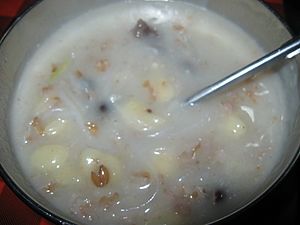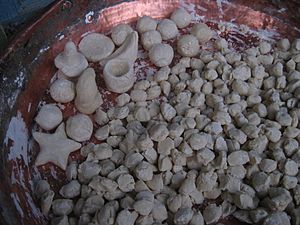Guthuk facts for kids
Guthuk is a special stew soup from Tibetan cuisine. Its name comes from the Tibetan words "Gu," meaning nine, and "Thuk," meaning stew soup. This soup is traditionally eaten on the 29th day of the 12th Tibetan month. This date is important because it's just two days before Losar, which is the Tibetan New Year.
Guthuk is a type of thukpa bhatuk, another popular Tibetan noodle dish. It's made with different ingredients like beans, vegetables, meat, and sometimes leftover grains from the harvest. It's a key part of a ceremony called Gutor (དགུ་གཏོར་). This ceremony, held on the 29th, is all about clearing away bad luck and negative energy from the past year. The goal is to start the new year fresh, peaceful, and full of good fortune. Barley is a common ingredient in this special soup.
Contents
Preparing for the New Year
On the day Guthuk is eaten, people in Tibet get ready for the new year. Families clean their homes very carefully. They also decorate their rooms to make them look festive and welcoming. Eating Guthuk is a big part of these preparations.
Special Traditions and Symbols
Temples and monasteries in Tibet also hold large dance ceremonies on this day. The biggest one happens at the famous Potala Palace in Lhasa. In the evening, people sometimes carry torches and shout out words to chase away bad spirits.
Monasteries perform special rituals to protect everyone and prepare for the Losar celebrations. It's a custom to make Guthuk with nine different ingredients, which can include dried cheese and various grains.
Dough Balls and Their Meanings
A fun tradition involves serving dough balls with hidden ingredients inside them. These ingredients are meant to give a lighthearted hint about a person's character.
- If you find chilies in your dough ball, it's a playful way of saying you might be very talkative!
- Finding white-colored ingredients like salt, wool, or rice is considered a good sign, bringing good luck.
- If you find coal, it's like finding coal in a Christmas stocking. It playfully suggests you might have a "black heart," meaning you've been a bit naughty.
See also
 In Spanish: Guthuk para niños
In Spanish: Guthuk para niños



